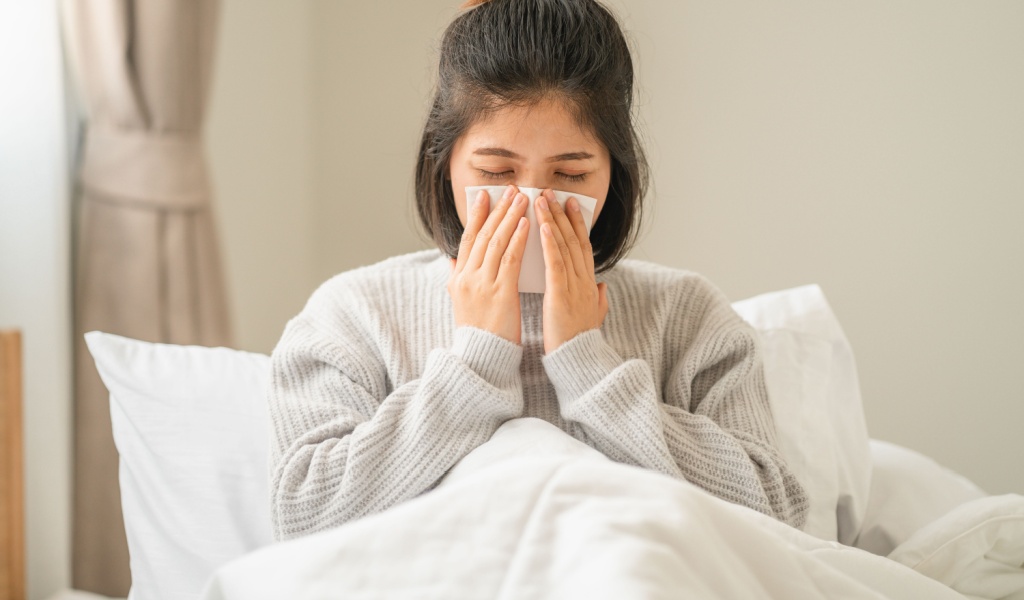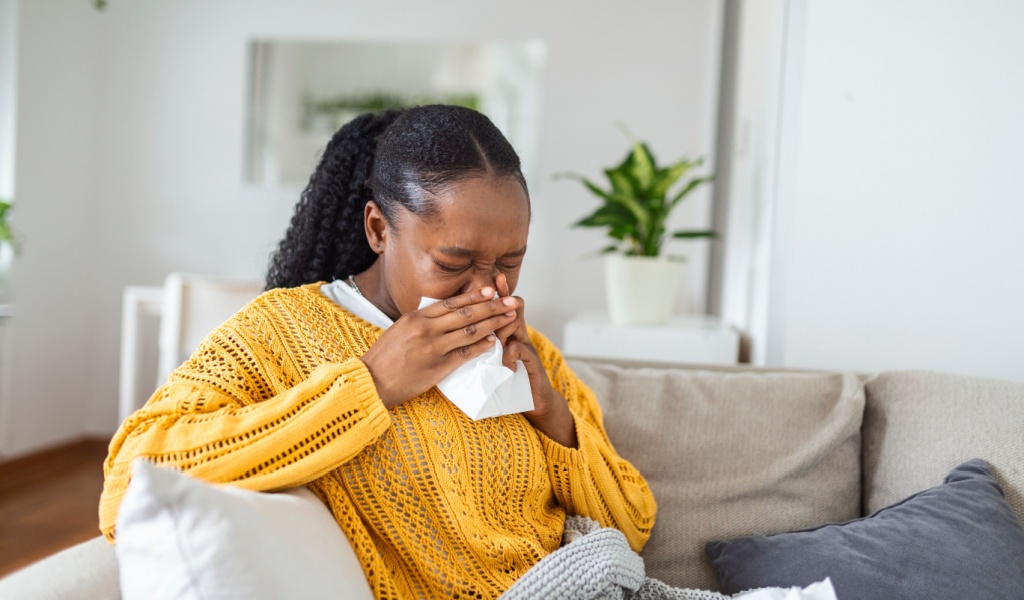Waking up with a stuffy or runny nose and sneezing non-stop can be frustrating – and it’s not a great way to start the day. As annoying as it may be, you are not alone – millions of people suffer from this! In fact, about 40% of Americans suffer from morning allergies, also known as allergic rhinitis.
Allergies can flare up at any time, but for some people, these symptoms show up only in the morning, after which they are fine for the rest of the day. Your nose can feel stuffy, runny, scratchy, or cause you to sneeze uncontrollably when the immune system overreacts to allergens, which causes inflammation and swelling.
Thankfully, there are many ways to manage morning allergies. Before we look into that, let’s understand what causes it.

Allergens That Are Responsible For This Condition
Dust Mites
If you’re allergic to dust, dust mites can be a key reason. These microscopic bugs live in our homes, and the bedroom is generally a breeding ground for them. It may not be so pleasant to hear, but dust mites live and even multiply on pillows, bedding, mattresses, and furniture. While these pests don’t bite or spread diseases, they can cause you to wake up with allergy-like symptoms in the morning.
Pollen
Similar to dust, pollen can also make its way inside your nose and trigger allergies. Pollen counts are typically at their highest in the morning, so if you are outside during this time of the day, you will likely experience sneezing, sniffling, and coughing.
Pet Dander
If your pet sleeps on your bed or in your bedroom, it can trigger morning allergies. Even if they don’t sleep with you, pet dander can collect on your bedding or get trapped in the carpet throughout the day, aggravating your allergies.
Mold
If your bedroom is near a bathroom or mold-infested area, your allergy symptoms could worsen in the morning. Mold may not always be apparent, as it can hide behind wallpaper or tiles, so it’s best to get your home inspected if you suspect that your allergies may be caused by mold.
Other Triggers of Morning Allergies
Allergens are not the only thing that can cause a stuffy or runny nose when you wake up; nonallergic rhinitis can also have the same effect. The only difference is that nonallergic rhinitis does not involve the immune system. The factors that trigger these symptoms are:
Strong Odors
Some odors, such as essential oils, scented shower gels, and body lotions, can irritate the blood vessels in the nose, causing an increase in mucus production and leading to congestion. You may wake up with allergy symptoms if you habitually apply products with strong odors at night. Consider switching to fragrance-free alternatives to avoid morning allergies.
Medication
A side effect of certain medications like aspirin, ibuprofen, sedatives, and pills to reduce high blood pressure can cause the blood vessels in the nose to dilate. If you are taking such pills before bed, they can trigger allergy-like symptoms in the morning.
Hormonal Changes
Menstruation, pregnancy, and the use of oral contraceptives can cause nonallergic rhinitis. A change in hormone levels leads to increased mucus production, which can lead to nasal congestion, runny nose, and sneezing.
Acid Reflux
Acid reflux occurs when stomach acid flows back into the throat. Sleeping flat or on your back can trigger reflux, which can lead to a sore throat, runny nose, and cough in the morning. Sleeping on your side can help alleviate allergies caused by acid reflux.

How to Deal With Allergy Symptoms?
Now that we’ve gone over what could potentially be causing your morning sneezes, let’s explore some options on what you can do to help alleviate those pesky allergies.
Close Windows and Doors
Opening windows invites allergens to enter your home. If you’re very sensitive to allergens, it may be a good idea to keep your doors and windows closed. You may use an exhaust fan to help with air circulation.
Use an Air Purifier or Humidifier
An air purifier clears the air in your bedroom and removes common allergens from outside, such as pet dander, dust mites, mold, and pollen. Additionally, a humidifier can help balance the humidity level in the room if you live in an arid climate or sleep with an air conditioner.
Ensure That Your Furniture Is Dust-Free
Dust and debris can collect in nooks and crannies of any room, so avoiding heavy drapes and upholstered furniture in your bedroom is advisable for those with sensitive noses. Ensure that you use tightly woven fabric for your pillowcases and bed sheets so that dust is not trapped. If you have stuffed toys, fake flowers, old books, or anything that can trap dust, get it out of your bedroom!
Also, make sure you dust hard surfaces at least once a week, and it’s best to get someone else to do this for you or wear a mask to prevent dust particles from entering your nose.
Make Your Bed Room a Pet-Free Zone
Pet dander and hair can seriously trigger allergic reactions, so ensure your pet sleeps in a separate room. If you pet your furry friends before bedtime, wash your hands afterward. Regular grooming and vet checkups can also help minimize shedding through quick diagnosis of skin issues or supplements.
Have a Bedtime Wash
Showering before bedtime can wash away pollen and dust, which is a good way to ensure you’re allergen-free before bed.
Talk To Your Doctor
Based on the severity of your allergic reactions in the morning, you can discuss treatment options with your doctor. There are several over-the-counter medications, prescription medications, and lifestyle changes that a doctor can recommend to help ease your symptoms.
The Takeaway
No one wants to get up in the morning with a scratchy nose and constant sneezing; it’s a demotivating way to start a day. So, if you’re experiencing morning allergies, the first step is to identify what triggers your symptoms. You can maintain a diary of your symptoms to help identify patterns and understand what triggers your allergies. This makes it easier to avoid or minimize exposure to those situations. At the same time, you can also explore the ideal treatment options to manage your symptoms.
Don’t let morning allergens get you down. You deserve a restful night’s sleep and wake up fresh, healthy, and sneeze-free!



